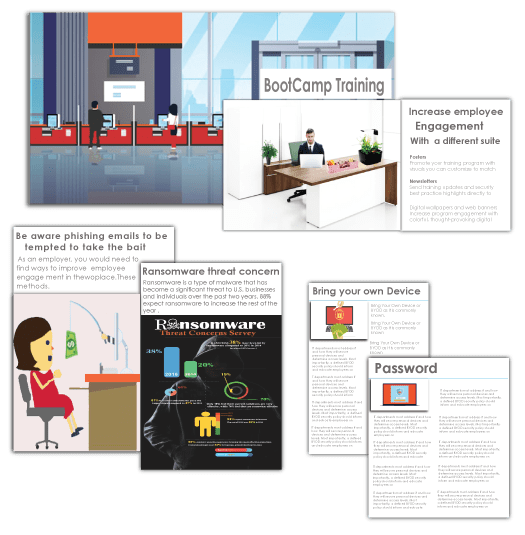Cyber Security Overview for Managers is designed for managers and other stakeholders who may be involved in decision making regarding their cyber environment but do not have a strong technical background. Discussions will not focus on specific technologies or implementation techniques, but rather cyber security methodologies and the framework for providing a resilient cyber presence. The course aims to help managers better understand how people and devices work together to protect mission critical assets and more effectively evaluate their cyber posture.
-
About this Course ?
In this IT manager training course, you will gain the skills to manage an IT environment, learn to lead with vision, motivate and empower with passion, facilitate effective communication, utilize time management skills for your team, and delegate with clarity. Managing in an IT environment can greatly differ from traditional management practices, so developing the soft skills necessary to effectively manage your information technology team is important. This course will provide the key skills and behaviors needed to get the most from your technical staff.
-
Why security awareness is important for managers?
Security awareness only for employees? Certainly not. Experts agree it is time for managers to move into a more active role when it comes to IT security. Nowadays, managers are required to be technologists in addition to business leaders, with the ability to address security concerns as well as manage somewhat complex technologies.
-
Why should take this course ?
Awareness programs provide a great way to educate personnel and keep the company’s IT security policy fresh in their minds. The idea behind a campaign is to motivate people to take information security seriously and respond accordingly, as Steve Durbin, a managing director of the Information Security Forum (ISF) emphasized in a CIO post. Any technical defense measure would be useless if the entire staff is not cyber-aware; a good security program has everybody involved by staying current with new technologies and understanding the common types of threats or attacks that can affect business operations.
-
Chapter 1: Cyber Security for Managers Course Outline
✔️ Introduction
✔️ The importance for Board Members and the C-Suite
✔️ Assessing the stakes of cybersecurity
-
Chapter 2: Major Issues in Cyber Security
✔️ Reviewing common cybersecurity terms
✔️ Related privacy issues
✔️ Defining cybersecurity principles
✔️ Why is cybersecurity so difficult?
✔️ Examining how high the stakes are
-
Chapter 3: Cyber Security Risk Management Process
✔️ The need for a risk management process
✔️ Recommendations of the use of risk management process
✔️ Reviewing cyber security frameworks
-
Chapter 4: Guidance for Board Members and the C-Suite
✔️ Establishing the proper cybersecurity governance model
✔️ Board responsibilities
✔️ Dealing with cybersecurity breaches
✔️ Management responsibilities
✔️ Key questions that need to be asked and answered
✔️ Using cybersecurity insurance
-
How often should I back up my data?
It depends on how critical that data is. If it's important that your data be accurate and available (to you or others), you should consider backing it up often. For example, you may want to back up critical project data at the end of each day or week.
-
What is an IT device?
An IT device is any device that is used to access, process, store, or transmit University information and that uses the University's IT infrastructure, including the University network. Examples of IT devices include desktop computers, laptop computers, smartphones, tablets, network devices, and printers.
-
What is information security?
Information security is the practice of protecting information and information systems from unauthorized disclosure, modification, and destruction. It encompasses the security of all IT resources, including both University information and the IT devices that access, process, store, or transmit it
-
What is confidentiality?
Confidentiality is the preservation of authorized restrictions on University information access and disclosure, including means for protecting personal privacy and proprietary information.
Confidentiality has to do with the privacy of information, including authorizations to view, share, and use it. Information with low confidentiality concerns may be considered "public" or otherwise not threatening if exposed beyond its intended audience. Information with high confidentiality concerns is considered secret and must be kept confidential to prevent identity theft, compromise of accounts and systems, legal or reputational damage, and other severe consequences.
- Key Features:
- Created by a Security expert :
- Access period : 12 months
- Course duration : 40+ hours
- Quizzes & revision exams :
- Certificate of completion :
- Support : 24/7 hours

Security Awareness for Manager

Developed for managers and those who supervise employees, this course will introduce concepts and techniques that will help managers in developing their staff into a security-savvy workforce, capable of defending against attacks from cybercriminals and other threat actors. This course is centered around a multi-point plan that when followed, will guide managers through the successful implementation of an effective security awareness program.
"Our Managers are too busy to be involved in our cyber security awareness and training program." We hear this statement a lot from our customers every day. This course provides practical, to-the-point training for the busy managers, in everyday language, complete with examples that are easy to understand.
Why Security Awareness is Important for Managers?
Security awareness shouldn’t be limited to just staff only. Managers, executives and even owners should be a part of the security campaign. As a matter of fact, having credentials from executives, managers are far more valuable to a hacker because of the level of access given to them. Managers can also be promoters for security and protection of assets.
Since managers understand their team, they are beneficial for their organization of the program. Managers can identify employee weaknesses in security education and address the issue with additional training. They can also organize groups and schedule the right training among teams.
The result of manager training leads to positive impact on security for the organization.

Managers are a Group That is Most at Risk

Managers have more access to sensitive data and systems, making it paramount that they are educated about the risks of handling this information. We have seen countless phishing attacks that target on the highest levels of executives, managers and ignoring these staff in training could be a costly oversight and loophole in your end user security plan.
Health and safety are critical parts of a risk manager’s role. They actively seek out problem areas in the organization and look to address them. They use data analysis to identify loss and injury trends and implement strategies to prevent them from reoccurring.. This clearly benefits employees in physical work environments, such as construction, but can also help office employees and those in similar positions through methods such as ergonomics. A safer workplace is better for everyone and is dramatically impacted by risk management.
They're Setting a Good Example for Staff
When Managers take training, they're ensuring their department takes training more seriously. For the laggards in their department not completing training, having the head of the department ahead of them is a convincing argument for them to complete their assignments. Even better, it's a great step in creating a culture of more secure behavior.
Anyone not participating in the new security measures constitutes a possible weak link. If everyone isn’t fully engaged, it’s all for nothing. This particular practice also assumes that all departments (e.g., HR, Legal, Security) must buy-in and help make it a reality.
Security awareness shouldn’t be limited to just staff. Managers, executives and even owners should be a part of the campaign. As a matter of fact, having credentials from executives is far more valuable to a hacker because of the level of access given to them. Managers can also be promoters for security and protection of assets.

Why security awareness training to your Managers

As a Managers you need to understand adequate about cyber security so you can have a confident conversation with your employees. These days cyber Security is everyone’s problem. With cybercrime damages expected $6 trillion by 2021, it is hardly surprising that cybersecurity has become an Executives level important topic now a days. The Managers are responsible for implementing of a sound cyber security program, including the overall guidance and direction of setting a cultural value related to risk awareness, policy and strategy, defining risk profile and creating security initiatives and priorities for organization.
Being a Manager, you will be targeted always
Managers in any organizations are regularly the target of cyber-attack by cyber-criminal, because of their access to valuable assets within the organization.
Implementing cyber security awareness program, security policies will help to mitigate cyber risk. It is critical that Managers must understand and follow their organization’s cyber security policies, so that when a cyber-criminal tries to manipulate them, staff can identify that something is unusual.

We work with you

Managers who take cyber security risk seriously are uniquely positioned to help senior management tackle cyber-security risk. When you partner with us, you benefit from our extensive knowledge and skills as we develop your business’s cyber security. As one of top cyber-security firm, we offer nearly 30 year’s experience in the technical, commercial and regulatory aspects of cyber security.
Aspire Tech Services and a Solutions is a leader of next-generation information technology (IT) services and solutions. Our mission is to enable superior returns on clients' technology investments through best-in-class industry solutions, domain expertise and global scale. The company is well known for its excellent challenge management skill on IT sectors which leads towards high customer satisfaction, best quality of work and add value to the commitment made to the clients.
COURSE MODULE ROLE BASED TRAINING FOR MANAGERS

Duration:
- 8/40 Hours
Ways to Learn :
- Virtual Training
- Virtual Instructor-Led Training
- Classroom Training
Course Audience:
- Intended for Managers
Course Language :

Course Topics:
Chapeter 1: Intro of Security Manager
- Introduction
- Assessing the stakes of cybersecurity
- The importance for Board Members and the C-Suite
Chapeter 2: Two major issues in security
- Reviewing common cybersecurity terms
- Why is cybersecurity so difficult?
- Related privacy issues
- Examining how high the stakes are
- Defining cybersecurity principles
Chapeter 3: Cyber Security Risk
- The need for a risk management process
- Reviewing cyber security frameworks and related
- Recommendations and description of the use of a risk
- Bring-your-own-device (BYOD) policy
Chapeter 4: Guidance for Board members
- Establishing the proper cybersecurity governance model
- Management responsibilities
- Board responsibilities
- Key questions that need to be asked and answered
- Dealing with cybersecurity breaches
- Using cybersecurity insurance
Boost Engagement with delivering Communication Tools

Increase employee engagement with a different suite of communication tools like:
Posters
Promote your training program with visuals you can customize to brand... more
Newsletters
Send training updates and security best practice highlights directly... more
Digital wallpapers and web banners
Increase program engagement with colorful thought-provoking messaging... more
Training Videos/Animations
Strengthen key awareness concepts and skills through stylish visual... more
Why Aspire Tech
Award-winning courses
Aspire's award-winning online courses and programs are created and delivered by a renowned Cyber Security specialist.
The perfect fit for business
Plans for small to large businesses that are flexible to match your budget. There is a volume discount available.
Cost effective training
For a fraction of the expense of traditional classroom training, train thousands of employees in numerous locations.


